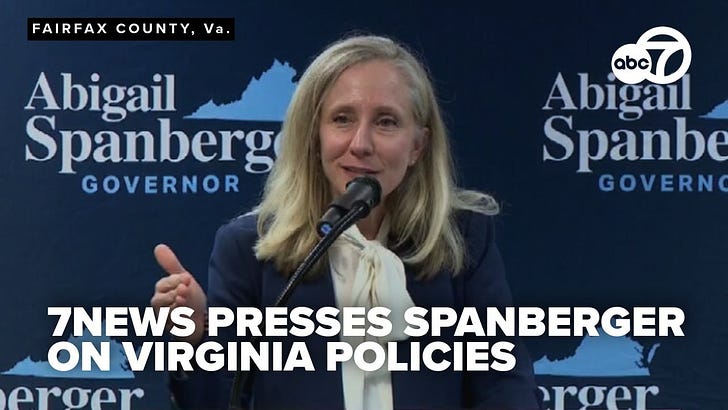On Election Day In Virginia Tomorrow
Set your expectations low
The polling scientists in any election always give us a parallax view of their opinion snapshots, as they all use different weights and assumptions and wording in their questions. While the polls vary in Virginia, not one of them has shown Republican Winsome Earle-Sears winning the governor’s race.
All the polls — every last one — have shown her losing by some number ranging from nearly 12 points according to one college poll to 5 points in an independent poll. Put all the surveys together, and Democrat Abigail Spanberger enjoys a ~7 point average polling advantage in the final hours before Election Day.
As I explained back in August, when I first noticed the race heating up, transgender ‘inclusion’ policies that allow naked pedophiles in girls’ public school locker rooms and punish children for correctly discerning each others’ sex were fueling a surge by the Republican.
The race gained a measure of national notoriety when Sears spoke at a local school board meeting and a Spanberger campaign volunteer showed up with a sign bearing a racist message that every TERF has encountered on social media thousands of times. It seemed that, whatever the outcome, the governor’s race was bringing the issues covered at The Distance into focus.
Yesterday, this post unlocked for free subscribers. I described the state of the race and the effective way Sears was using Spanberger’s past support of ‘transgender inclusion’ legislation against her. By that point, the net effect was already visible in the polling. Would the trend continue, though? As Democrats and teachers’ unions began putting resources into the shoring up Spanberger’s support, that was the big, open question.
Early voting ended on Saturday. Altogether, 1,430,913 early ballots were cast in 2025 versus 1,194,252 in 2021, according to the nonprofit tracker I have been following. Throughout the early voting period, Democrats denied that there was any problem with Richard Cox letting it all hang out in the girls’ locker room. They followed the new Democratic playbook, dismissing and minimizing the issue.
In Virginia, that is probably still enough to win. There are 147,000 federal workers in the northern, urbanized regions of Virginia, for example. Furthermore, as any American TERF can attest, Trump derangement has prevented many Democrats from admitting or addressing the obvious problems with transgender ‘inclusion’ policies that they will acknowledge in private. Indeed, there are many ‘gender critical’ disillusioned Democrats who still do not vote for Republicans.
By mid-September, it was obvious that Virginia Democrats were furiously trying to deny that ‘transgender access’ scandals in Loudoun and Fairfax County were undermining them with voters at all. The issue was playing right into Sears’s strengths and Spanberger’s weaknesses. But would it matter? This post unlocked earlier today.
A week later, it appeared that Sears’s momentum had peaked with “likely voters.” At that point, Sears had a slim hope that less-engaged, mostly rural voters — the kind that the 2024 Trump campaign successfully mobilized three times in Virginia — might be mobilized. There are signs that her campaign had some success with this strategy. The assassination of Charlie Kirk also likely drove turnout activity, especially in churches.
Unfortunately, Republican voters have been conditioned against early voting, which they see as rife with fraud, so it remains to be seen just how successful Sears and Turning Point have been at banking votes ahead of Election Day tomorrow. I am no Pollyanna. However, I will be watching the ‘delta’ — the difference — between what Democrats and left-leaning surveys have told us to expect, and what actually happens when all the ballots are unsealed. This piece unlocks on Wednesday.
In a free piece that I wrote for Genspect, I noted that the Republican candidate Glenn Youngkin had overperformed in 2021, and that opposition to transgender ‘inclusion’ was at least as salient with voters as abortion, according to the very polls being used to dismiss and minimize the issue.
Violence was the intervening variable in Virginia during the last few weeks of the race. Things had barely calmed down after Charlie Kirk when disturbing three-year-old text messages from Democratic attorney general candidate Jay Jones came to light. At this hour, it seems that Virginia voters may punish Jones, but only Jones. Sears has not gained new momentum from the scandal.
One positive result is already certain: the era of ‘no debate’ is over. It ended in Virginia when local media outlets, including debate moderators, asked Spanberger hard questions. This post unlocks on Thursday. Candidates matter more than issues. Whatever Sears’s flaws as a candidate, however, she utterly exposed Spanberger as the ideological agent, the one pushing the unpopular position. She made the most of it, but how much difference did she make in Virginia?
Democrats are the party in opposition right now, which generally boosts turnout. The federal government shutdown also plays into the race, though it remains to be seen whether and how much Democrats helped themselves with the shutdown. Democrats would not bring Barack Obama to hold a big rally in Virginia if they felt completely confident about the outcome.
With this many intervening variables, it is impossible to say just where the final tally will land on Tuesday night. We can only say that Winsome Earle-Sears is very unlikely to win, hope she takes a big bite out of Abigail Spanberger’s ‘aura of invincibility’, and commit ourselves to the fight for the duration.
My podcast interview with Anita Bartholomew will be published for premium subscribers tomorrow a few hours after my review of her book (below) unlocks. If you are a free subscriber, consider upgrading to have early access to premium content.
The Silencing Of The Gender Lambs
A theme is emerging. As the decade of ideological transgenderism dissolves, books on the topic now consistently resemble horror fiction on the subject of ‘trans kids’. Parent stories about clinics, schools, and whole communities ‘affirming’ their children on the flimsiest of ‘identity’ pronouncements have too much in common with films like









